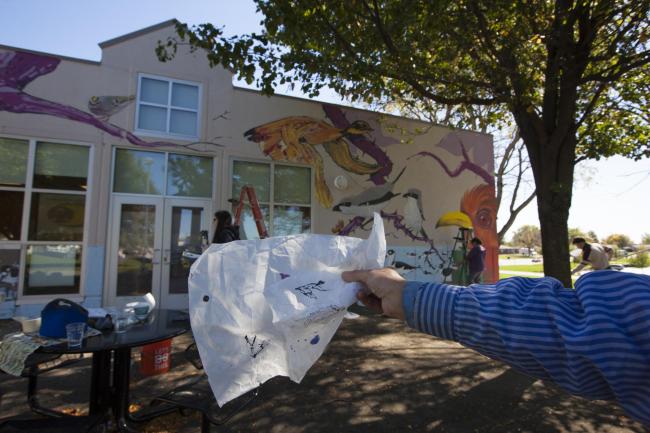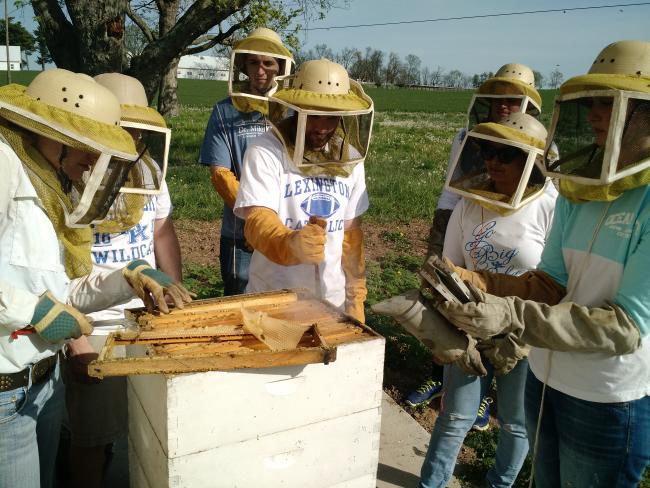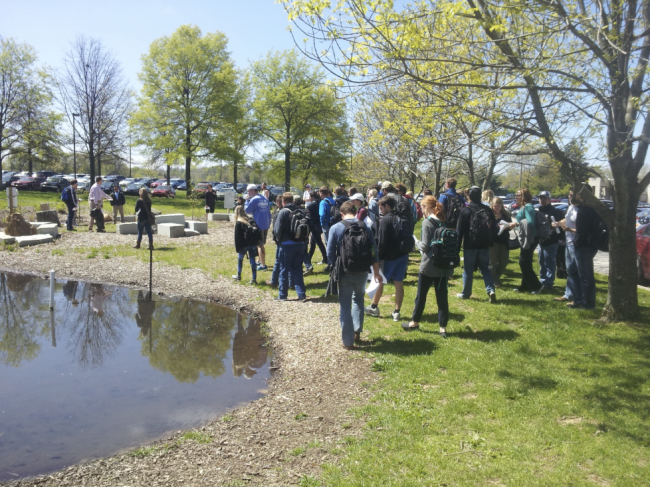Association for the Advancement of Sustainability in Higher Education (AAASHE) Conference 2015 (Minneapolis, MN)
Approved: 9/18/2015
Funding Amount: $5,750
This proposal will provide funding for 5 students to attend the 2015 AASHE Conference and Expo in Minneapolis, MN. This project aims to increase the practice of sustainability at UK by allowing a group of students to serve as knowledge ambassadors following the conference. These students will return to Lexington with the blueprints, ideas, and connections necessary to advance sustainability on college campuses, positively impacting the campus community. AASHE also addresses sustainability from a whole-systems perspective, with economic justice and DE&I forming the cornerstone of the program design.
Hitnes’ The Image Hunter Talk and Mural Making Workshop
Approved: 9/18/2015
Funding Amount: $2,000
Since late July 2015, the internationally known artist Hitnes, from Rome, Italy, has been traveling throughout the eastern United States working on The Image Hunter, a project where he has loosely retraced the route of John James Audubon, spending time observing birds in nature and then painting the results in murals. This project had Hitnes provide a two-hour talk called “When Art and Science Collide” and also conduct a two-day mural master class. This Master Mural Class is an opportunity for UK students to take an intensive workshop with a highly esteemed artist.
Pictured: Hitnes' workshop to paint a mural at the UK Ecological Research & Education Center. Photography (c) Carlos Gutierrez.
In Motion: Student Design Exhibition
Approved: 9/18/2015
Funding Amount: $1,900
The 2015 Design Week was structured after LA’s annual design week and included students from LA, School of the Interiors, and Historic Preservation. The overarching goal of the week was to provide students with a real-world experience through data collection and evaluation of commuting experiences, identification of key problems, and development of potential solutions. Approximately 60 students participated in the week’s activities which included an assessment of various campus routes utilizing a data collection App, a field trip to Indianapolis to explore the Cultural Trail as a comparative study, and lecture and panel discussions with urban planners and developers. The data collection effort
included a biking and walking assessment of various, typical daily routes through the UK campus based on several parameters such as safety (lighting, proximity to traffic), aesthetics and comfort (what makes the commute pleasant?), wayfinding (how does a newcomer know where to go?), etc. These results were used to develop a shared composite map cataloging their experiences. The week culminated with each student team presenting their findings and identifying key problems. This proposal funds a Design Exhibition and Reception to present the students’ work to the UK community.
The Science and Business of Insects
Approved: 10/13/2015
Funding Amount: $1,658
This project is to partially fund the 2-credit class, “Science and Business of Insects” (AEC/GEN 300 Sect. 007), the primary goal of which is to inform students on current matters involving the intersection of insects with human behavior and economics. An integral piece of this goal is to foster critical thinking about the environmental and economic ramifications of insect-related issues such as pollinator conservation, long-term effects of insecticide use and other intensive management practices, and general biodiversity conservation. In so doing, the class will educate students (up to 22) on how humans impact the natural world in ways that have economic effects through intentional and accidental manipulation of insect presence and biodiversity.
Pictured: Students from AEC/GEN 300: Science and Business of Insects learning about honeybees.
Urban Forestry Seminar Series
Approved: 10/13/2015
Funding Amount: $3,725
Funding for this project will allow the Urban Forest Initiative to host four urban ecology specialists for their Urban Forestry Seminar Series who will address ecological, economic and social benefits of urban trees in their lectures. The
seminar series is scheduled for September 2015 – March 2015 in venues readily accessible to students and the campus community and will be sponsored by multiple entities across campus and the community.
Sustainability Summer Research Fellowships (2016)
Approved: 10/27/2015
Funding Amount: $10,000
Funding for this project will support five undergraduate fellowships. The fellowship program provides financial support and professional development to undergraduate students conducting sustainability-related research aligned with the United Nations' 17 Sustainable Development Goals. This opportunity is designed to support a student’s close collaboration with UK faculty and is intended to provide the student with an opportunity for intensive and self-directed research or creative work while advancing the university’s goals of sustainability.
LEED Green Associate Training Scholarship
Approved: 10/27/2015
Funding Amount: $750
Funding for this project will fund five students to participate in the LEED Green Associate Training on November 11th on UK’s campus. To become an associate, an individual must exhibit their knowledge of current sustainable building practices on an exam and be committed to a professional future in the building industry. On November 11th, Leading Green is offering a class on UK’s campus that educates students on these practices and meets the exam’s eligibility requirements. This project aims to increase the number of students attending the class by providing financial assistance to five students selected by an application process.
Intergenerational Mentoring Program: Connecting Students and
Older Adults
Approved: 11/10/2015
Funding Amount: $5,000
Funding awarded to this project will broaden the Campus Kitchen at the University of Kentucky's (CKUK) operating programs. CKUK’s student volunteers will prepare home-cooked meals from recovered food and hand- deliver them to 30 older adults in Lexington, KY through an Intergenerational Mentoring Program. A bag of groceries will be assembled based on the nutritional needs of older adults. The groceries will accompany the meal and companionship to 5-10 home-bound older adults. Students and adults will continue to build relationships by interacting on a weekly basis. The goals are to promote healthy eating, community engagement, and environmental sustainability while focusing on improving social cohesion and food security in our local Lexington community and campus through student-led service.
Dimensions of Political Ecology Conference 2016
Approved: 11/10/2015
Funding Amount: $7,955
Since its origin in 2009, the DOPE conference has been centered around decolonial, feminist, and critical scholarship and activism. DOPE has always engaged scholars and activists from a wide range of backgrounds from all over the world, whether or not they identify as political ecologists, including folks working in the humanities, sciences, and social sciences. This proposal provides funding for honorariums, speaker travel and lodging, advertising, food, and miscellaneous expenses for this year’s conference to continue DOPE’s long-standing tradition of creating a space for participants to foster praxes of radical care, abundance, reciprocity, and interculturality.
Gato Del Sol VI
Approved: 12/08/2015
Funding Amount: $8,000
This proposal will fund the development of the UK Solar Car team's next solar car: Gato Del Sol VI. This car, which is completely student built, requires a vast array of components to run properly and safely from only solar power. Furthermore, the team's main goal with the car is to win in races against other colleges’ solar cars, events which promote the development of sustainability-minded engineers.
Supporting Monarchs and Pollinators through Citizen Science and Public Engagement
Approved: 12/08/2015
Funding Amount: $18,844
This project aims to assess multiple methods to increase the population of the iconic monarch butterflies and other pollinator species in Kentucky through economically viable and community-based mechanisms. The first mechanism entails implementing a citizen science study. This project will conduct a “Paired Pot” citizen science project in two neighborhoods, the relatively economically disadvantaged neighborhood of the Ecological Research and Education Center (EREC) in northern Lexington and the Greg Page/Shawneetown campus apartments. The primary goal is to determine the contribution by monarchs and other large butterflies to seed production by milkweed plants; a secondary goal is to quantify visits by major groups of pollinators including bees to flowering milkweed. The SSC will support the initial purchase of materials to set up and maintain this citizen science project through the summer of 2016.
The Ecology of the Martial Eagle in the Maasai Mara Region of Southern Kenya
Approved: 01/16/2016
Funding Amount: $6,500
This research project seeks to study the ecology of the Martial Eagle, the largest species of eagle in Africa and listed as vulnerable by the IUCN, in the Maasai Mara. The specific objectives of this project include assessing the species’ diet, estimating its home range size, characterizing its nesting locations and understanding its habitat use. A unique team of highly skilled and experienced collaborators has been assembled to carry out this project and ensure its success. This project would constitute the first Martial Eagle study to have been conducted in East Africa in over fifteen years and would provide essential ecological information that is required to adequately inform this species’ conservation.
Partnership to Expand Outdoor Recycling Options
Approved: 01/16/2016
Funding Amount: $10,000
In the spring of 2012, thanks to a proposal by a student in the College of Public Health, funding from the Student Sustainability Council, and a partnership with campus PPD, UK launched its first full scale outdoor recycling pilot program. In the years since the launch of the program, the number of outdoor locations served by the program has steadily grown and now stretches from WTY Library to the UK Student Center and includes Engineering, Law, Business, and Memorial Hall and the Kirwan Blanding Complex. The College of Agriculture and UK Healthcare are now priority areas for expanding the program.
This proposal is for funding to continue a partnership between the UK SSC and the UK PPD to purchase and install additional outdoor recycling receptacles to be placed strategically around campus.
2016-2017 Sustainability Internship Program
Approved: 01/16/2016
Funding Amount: $9,000
The Sustainability Internship Program (SIP) is coordinated by the Office of Sustainability in partnership with operational units around campus that have a focus on sustainability. Funding for this project will cover pay for interns to dedicate 5-10 hours weekly to their operational unit to advance sustainability initiatives in exciting and meaningful ways.
American Kestrel Nest Box Project
Approved: 02/03/2016
Funding Amount: $1,000
This pilot project will construct ten American kestrel nest boxes on University of Kentucky property, specifically Main Chance, Spindletop and Cold Stream farms (The North Farm Complex). These ten boxes will be placed in locations deemed suitable by the management committee of the farm complex. The goals of the project are to benefit American kestrel populations on University of Kentucky property and to create a study population of American kestrels that is available to University of Kentucky students for research. This project will also support the work of the international non-profit “The Peregrine Fund” who are conducting research investigating the large-scale population declines of American kestrels. If successful, the project managers hope to expand this effort to other University of Kentucky properties.
Beaux Arts Spring Ball 2016
Approved: 02/03/2016
Funding Amount: $1,000
The Beaux Arts Foundation is one of the largest student-run, non-profit organizations in the state of Kentucky. Each year, the Beaux Arts Ball is thrown to raise money and awareness for charities in Lexington such as Broke Spoke, Bluegrass Rape Crisis Center, Home of the Innocents, CASA, and the Governor’s School for the Arts. A long-held tradition of the Beaux Arts Ball is the student-designed installations. Students submit their proposals to the annual Beaux Arts Ball installation Competition, where the public can vote for the designs that they would like to see fabricated at a large-scale for the night of the ball. Funding for this project will go towards sustainable materials for the Beaux Arts students to use in their installations.
Tree Labeling Initiative
Approved: 02/17/2016
Funding Amount: $565.45
The purpose of this initiative is to facilitate student and faculty learning about trees on campus and to help them build relationships with the trees they see throughout campus every day. The idea is that the more you know about something, the more likely you are to care for it and protect it. This project will label trees to ensure that they are around for years to come while calling attention more broadly to the urban tree canopy. In addition to the species and native range, the sign will feature a QR code, which, when scanned, will take the user to a “Fun Tree Facts” page about the individual species.
Sustainability and Garden Science
Approved: 02/17/2016
Funding Amount: $6,820
Sustainability is a concept that cuts across the basic sciences and social sciences, with increasing resonance in our society. Garden science is an ideal means of conveying the concept of sustainability, enabling students to see plants as sustainable systems for which science provides some important insights. This project will develop a sustainability and garden science (SGS) program in collaboration with teachers and UK graduate and undergraduate students to be implemented in local Lexington elementary schools. There are four main goals for this project: (1) to teach elementary students about sustainability through the analogy between plant function and human resource use, (2) to teach elementary students basic biological principles related to structure and function of plant parts, life cycles, energy flow, nutrient cycling, and experimentation, (3) to teach elementary students from communities of relatively low socioeconomic status about gardening and sustainable living and (4) to connect UK students with the community to the benefit both of the students and the community.
Campus Rain Barrel Project
Approved: 02/17/2016
Funding Amount: $968.28
The goal of this project is to place a piece of functional artwork on campus in the form of a working rain
barrel. The intended location is on the side of President Capilouto’s garage, as it is a building on campus that is
most like the normal residence where a rain barrel would be used. The rain barrel will capture the attention of
passerby with the extravagant artwork painted by a local artist, and signage will educate students and faculty
of its purpose and functioning. Rain barrels demonstrate sustainability in the form of water conservation, as
rainwater is stored and then recycled as garden water for plants. This is a free, self-sustaining water supply,
reduces the risk of residential flooding and decreases the amount of storm-water runoff that can carry
pollutants to streams.
Student Sustainability Council 2016 Fall Retreat
Approved: 03/02/2016
Funding Amount: $1006.80
Funding for this project will cover transportation, meals, and cabin rentals for the SSC's annual one-night fall retreat at Robinson Forest. Fall retreat is designed to help new and returning members of the Council acclimate to the SSC's culture and functions in a more comfortable setting than standard SSC meetings. New members in particular will benefit from the information, discussions, and collaboration that are central to the retreat.
Catalyst Summer Training Program
Approved: 03/02/2016
Funding Amount: $2,100
Catalyst is a week-long training camp hosted and developed by Kentucky Student Environmental Coalition leaders to train and empower 30 young people from across Kentucky and develop a trainings team of 9 leaders to prepare and deliver trainings and workshops. Their goal is for participants to use the network formed at Catalyst to encourage them to put roots in Kentucky and fight for change for decades to come. The curriculum will cover grassroots organizing skills, everything that folks need to know to launch a team, run a successful strategic campaign, and work towards consensus based, anti-oppressive, positive change.
Sustainability Challenge Grant Program, Year 3
Approved: 04/06/2016
Funding Amount: $33,333
This proposal will partially fund the 3rd year of the Sustainability Challenge Grant program. The purpose of the program is to engage multidisciplinary teams from the University community in the creation and implementation of ideas that will promote sustainability by simultaneously advancing economic vitality, ecological integrity, and social equity. Each project funded to date has had a high degree of student participation though the nature of that participation is not prescribed and varies from project to project. Students are gaining valuable experience in project coordination, curriculum development, community outreach, public speaking, report preparation, and research.
Fate of Heavy Metals at the CATchment
Approved: 04/20/2016
Funding Amount: $3,500
The SSC, partnering with TFISE, LFUCG, and several departments with CAFÉ, previously funded construction of the rain garden established on the University of Kentucky campus adjacent to the Gluck parking lot (recently named CATchment). CATchment has been used as an outdoor living laboratory for PLS 366 (Fundamentals of Soil Science) and EES 385 (Hydrology and Water Resources) to teach undergraduate students how to collect and characterize water samples. Preliminary data from a few sampling events indicate that zinc, a heavy metal which can enter the environment via tire-wear particles, is present in higher concentrations in water collected at the inlet when compared with the basin and the bank. It is unclear whether this rain garden is able to serve as a sink for zinc and other heavy metals without additional time-series data. The goals of this project are to evaluate the potential of CATchment to serve as a sink for heavy metals and to disseminate this information to UK undergraduate students and Extension offices throughout the state.
Pictured: Students from PLS 366 (Fundamentals of Soil Science using the CATchment Rain Garden as a living lab.
Environmental Economics Seminar
Approved: 04/20/2016
Funding Amount: $200
This project is for a seminar given by Dr. Craig Landry from the University of Georgia. The UK Department of Agricultural Economics would like to host Dr. Landry from Monday, May 1st through Wednesday, May 3rd, 2016. Tentatively, the title of his talk is “Economic Values of Coastal Erosion Management.” This project focuses on analyzing various management and protection strategies to mitigate coastal erosion in North Carolina including each strategy’s environmental impact such as water and sand quality, as well as the perception of such policies by residents and tourists.
KSEC Trainings for Greenthumb
Approved: 04/20/2016
Funding Amount: $500
These funds will go towards the facilitation of three separate trainings in environmental activism conducted by the director of KSEC for UK Greenthumb during the fall semester of 2016. The Kentucky Student Environmental Coalition is a low-budget non-profit organization dedicated to advancing environmental and sustainability awareness in communities and campuses across Kentucky. Cara Cooper, the director of KSEC, has extensive experience in environmental activism in Kentucky and offers trainings on topics such as campaigning, leadership development, organizational development, fundraising, and special issues to campus groups. The money from the SSC will compensate for transportation, materials, and time needed for three such trainings during the fall semester, along with the facilitation of a pre-semester planning meeting to outline Greenthumb’s goals for the semester.
UK’s Butterfly Garden Maintenance
Approved: 04/20/2016
Funding Amount: $1,500
These funds will go towards the facilitation of three separate trainings in environmental activism conducted by the director of KSEC for UK Greenthumb during the fall semester of 2016. The Kentucky Student Environmental Coalition is a low-budget non-profit organization dedicated to advancing environmental and sustainability awareness in communities and campuses across Kentucky. Cara Cooper, the director of KSEC, has extensive experience in environmental activism in Kentucky and offers trainings on topics such as campaigning, leadership development, organizational development, fundraising, and special issues to campus groups. The money from the SSC will compensate for transportation, materials, and time needed for three such trainings during the fall semester, along with the facilitation of a pre-semester planning meeting to outline Greenthumb’s goals for the semester.
SSC K-Week Tabling and Supplies, August 2016
Approved: 04/20/2016
Funding Amount: $1,000
The Student Sustainability Council will be hiring an intern for the summer to manage various council related activities. One of their tasks will include preparing for the Council's presence during K Week 2016, an event for new students to become integrated into the campus. This is a great opportunity for the Council to reach out to new students and spread the word about the pool of funding that is available to all Students and Staff.
Maintenance of the SSC and Gaines Center Campus Garden
Approved: 04/20/2016
Funding Amount: $200
This proposal is a request for the continuation of the upkeep of a campus garden co-owned by the SSC and the Gaines Center for the Humanities. The garden was founded a few years ago by a Gaines Fellow as a jury project. Work on the garden not only improves the aesthetic of the area around the Gaines Center, it allows student workers to gain valuable experience growing local, organic food. With the exception of working on a farm, this may be a unique and inexpensive opportunity for students interested in food science or sustainable agriculture to see produce go from seed to table in their college years.





